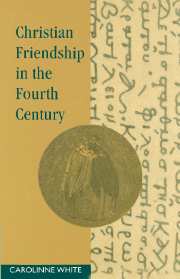Book contents
- Frontmatter
- Contents
- Preface
- Abbreviations
- 1 Introduction
- 2 Classical theories of friendship
- 3 Some problems of Christian friendship
- 4 Friendship in the lives and thought of Basil and of Gregory of Nazianzus
- 5 John Chrysostom and Olympias
- 6 Synesius of Cyrene
- 7 Ambrose of Milan – Ciceronian or Christian friendship?
- 8 St Jerome
- 9 Paulinus of Nola
- 10 Monasticism and friendship
- 11 St Augustine
- Conclusion
- Notes
- Editions and translations of primary sources
- Select bibliography
- Index
4 - Friendship in the lives and thought of Basil and of Gregory of Nazianzus
Published online by Cambridge University Press: 06 July 2010
- Frontmatter
- Contents
- Preface
- Abbreviations
- 1 Introduction
- 2 Classical theories of friendship
- 3 Some problems of Christian friendship
- 4 Friendship in the lives and thought of Basil and of Gregory of Nazianzus
- 5 John Chrysostom and Olympias
- 6 Synesius of Cyrene
- 7 Ambrose of Milan – Ciceronian or Christian friendship?
- 8 St Jerome
- 9 Paulinus of Nola
- 10 Monasticism and friendship
- 11 St Augustine
- Conclusion
- Notes
- Editions and translations of primary sources
- Select bibliography
- Index
Summary
In the preceding chapters I have given some idea of the Classical and Christian material on the subject of friendship which was available to the writers of the fourth century and which inevitably would have affected their views to some extent. It is now time to consider how these Christians experienced friendship in their own personal lives (as documented primarily by letters between the friends) and to try to see how this experience and their knowledge of earlier theories on the subject influenced their own ideas about the nature of friendship and its role in a life lived strictly according to Christian ideals.
The fact that two of the leading Christian writers and Church men in the Greek East during the fourth century, St Basil the Great who became bishop of Caesarea, and St Gregory of Nazianzus, later patriarch of Constantinople, had a long-lasting and close friendship is well-known, but this fact might lead one to suppose that there was complete agreement between them, whereas actually it is clear that they held rather different views about the way a devoted Christian could best serve Christ and had different expectations about their friendship and where a Christian friend's priorities should lie. In attempting to chart the course of their friendship as it developed at Athens and in Cappadocia over a period of almost thirty years, it is necessary to bear in mind that our knowledge of it is derived almost exclusively from the writings of Gregory, so that Basil's view of it, especially in its early stages, is sometimes unclear, or at least seen only through Gregory's reaction to what Basil says.
- Type
- Chapter
- Information
- Christian Friendship in the Fourth Century , pp. 61 - 84Publisher: Cambridge University PressPrint publication year: 1992



